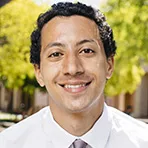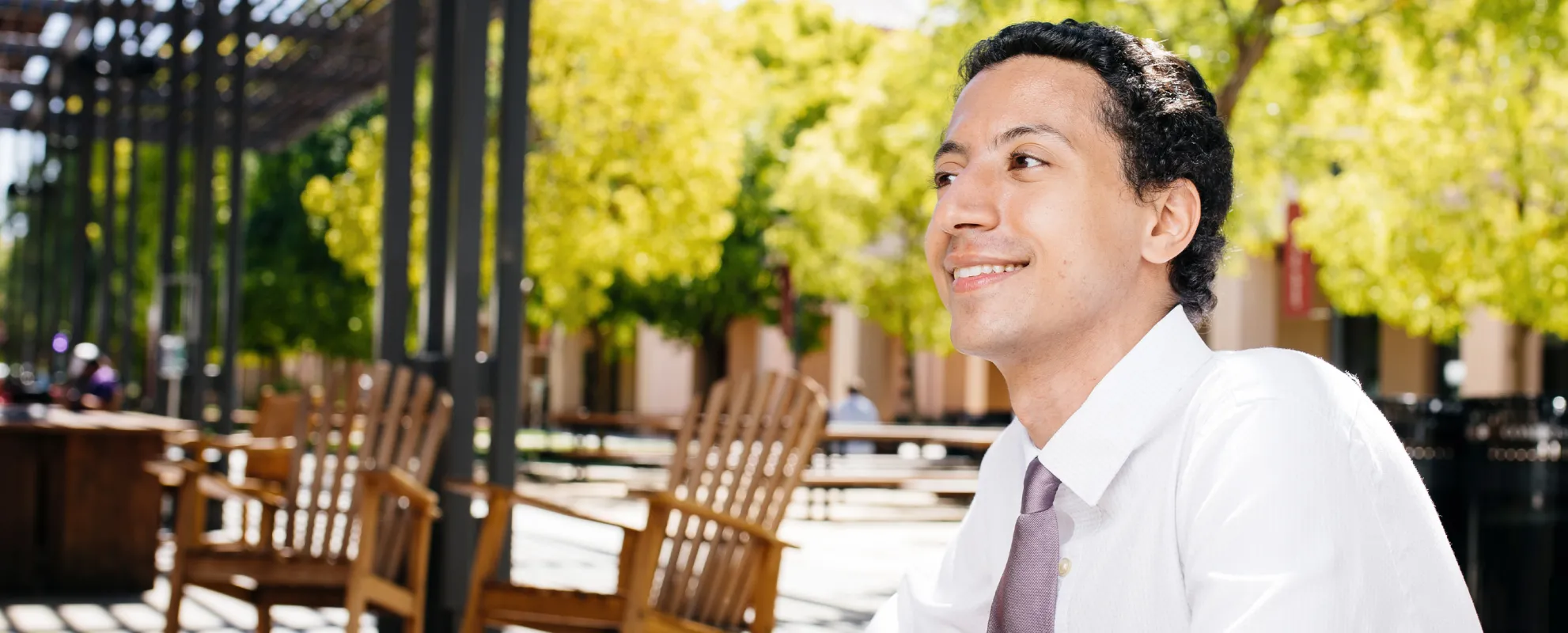As a lawyer, social entrepreneur, and author, Andrew Leon Hanna has assembled an arsenal of skills to help ensure equal human rights and socioeconomic opportunity for all.
“My vision of how to make an impact is through a combination of law, social entrepreneurship, and writing,” says Hanna, whose parents emigrated from Egypt to Jacksonville, Florida. “My hope is to continue to help create opportunities for people who are most vulnerable — and ensure they are treated with and portrayed with dignity.”
Hanna’s toolbox is diverse. In 2019, he earned a JD with honors from Harvard Law School, where he was an editor of the Harvard Law Review. In November, he launched DreamxAmerica, a social initiative he cofounded that combines storytelling and economic support for immigrant, refugee, and first-generation entrepreneurs.
On the storytelling side, he cocreated and produced DreamxAmerica, a documentary short, now streaming on PBS, that celebrates immigrant entrepreneurs. Shortly after the film’s release, DreamxAmerica chartered a special initiative with Kiva U.S., a crowd-lending nonprofit, to help small business entrepreneurs find the capital they need to pursue their dreams. The partnership has already distributed more than $100,000 in no-interest, no-fee loans to small businesses across America, in part to help ease the impact of COVID-19. Hanna is also writing a book about refugee entrepreneurs, titled 25 Million Sparks.
Hanna previously was a senior associate at McKinsey, where he led the launch of a youth employment nonprofit in his hometown of Jacksonville. In 2011, he was one of two State Department delegates to represent the U.S. at the 7th UNESCO Youth Forum in Paris. He also has served as an intern in the White House and Justice Department, is a Stanford Knight-Hennessy Scholar, and has been named to the Forbes 30 Under 30 list.
Explain how your family’s immigration experience shaped your career path.
I was born in Florida, and my dad grew up in a small village in Upper Egypt of a few hundred people. Nobody spoke English and few attended high school. Yet he imagined a world in which he would become a doctor in the U.S. He imagined it, and he accomplished it. He led his own practice for more than 30 years. He has deeply impacted thousands of patients in Jacksonville, on top of writing a book on how to improve the American health care system. My mom equally inspires me. She, too, went to medical school in Egypt and has been a preschool teacher in the U.S. She empowered and uplifted all of her students and taught me how to treat people with radical equality. So in learning from the two of them, I came away with a vision of a world in which imaginations can be fostered in everyone, and everyone can be treated equally.
And how does that connect to your work?
When you hear about immigrants in the media, it’s often one of two narratives: They’re portrayed either as victims or as villains. I know firsthand that those portrayals miss the fundamental dignity of immigrants, because I’ve seen the incredible impact my parents and so many others have made on their communities — and, beyond impact, their immeasurable value in and of themselves. Seeing those one-dimensional portrayals, and knowing that’s not the felt experience of communities on the ground across America, is in part what led me to work on DreamxAmerica.
Is there a common thread among the three immigrant entrepreneur stories you tell in the film?
There are several, and they appear not just among the folks featured in the film. For example, virtually every loan application we see talks about wanting to help their local communities — a beautifully selfless thing, especially given the challenges that small businesses have faced during the pandemic. Because they’re in a new place, and often without anyone else, immigrant and refugee entrepreneurs frequently have a deep desire to use their abilities to build up their communities and support others.
How are you measuring the success of DreamxAmerica’s impact initiative with Kiva?
First, we want to distribute as many interest-free dollars as possible to small businesses, especially during the pandemic. We’re primarily focused on immigrant, refugee, and first-generation entrepreneurs, but the program is open to all entrepreneurs in the U.S. Second, COVID-19 has hit small businesses very hard. Before the pandemic, the average small business had cash on hand to cover only about two weeks of outflows in the event of a disruption in revenue. In the short term, we want to help these businesses survive the pandemic. In the long term, we also hope that the infusion of capital helps them rebound, generate more jobs, and have a bigger socioeconomic impact on their communities.
What kind of outreach do you do?
For example, we’ve partnered with an immigrant welcoming center in Maine, a small business development center in Illinois, and an economic development organization in North Carolina. This is key because navigating banks’ processes is complex, particularly when there are language barriers, and less than half of small businesses find solutions to their financing needs. Entrepreneurs apply to us, we commit to offering constant personal support to ensure their loan applications are completed and as strong as possible, we endorse their loan applications to Kiva, and we work closely with Kiva U.S.’s leadership to ensure the loans are funded.
What are the primary immigration challenges facing the U.S. right now?
You have to ensure that basic human rights of asylum seekers are protected and that they are being granted due process under the Constitution. The folks fleeing Central America today, for example, are often women and children who were targeted by gangs, assaulted in their home countries, and in need of refuge. More than half of asylum seekers don’t have legal representation, and the odds of securing asylum without representation are dramatically reduced. Critical decisions on refugee status are consequently being made with very limited information, and vulnerable people are being sent back to life-threatening danger. The next thing is to ensure access to real socioeconomic opportunities for all types of migrants. Immigrants have double the average rate of entrepreneurship in the U.S. and have revitalized local economies. They just need opportunities, meaningful access to capital, and support from their communities.
How does your Harvard law degree help you reach your goals?
It’s a valuable tool to help me ensure that folks are being treated with equal dignity under the law. My legal writing has been related to the constitutionality of solitary confinement in prisons and the constitutionality of deportation hearings for children without legal counsel. At Harvard, I represented those accused of crimes in Massachusetts court hearings. Being a lawyer helps when I’m trying to ensure that baseline human rights are respected.
Why did you decide to seek an MBA from Stanford?
I came here to learn how social enterprises can create sustainable solutions and provide tangible opportunities that enable people to advance.
Are there any Stanford GSB classes that have been particularly helpful?
The foundational ethics course with Ken Shotts was valuable in terms of considering how businesses can think beyond shareholder value. If you’re going to be in a position to influence the lives of many people, it’s important to think critically about different theories of justice and what it means to treat people with dignity in and of themselves rather than merely as a means to an end.
You’ve also mentioned writing as a third component of your career plans. Tell us more about your book.
25 Million Sparks focuses on entrepreneurs in the Zaatari refugee camp in Jordan and refugee entrepreneurs in more than 20 other camps and cities around the world. It shares the stories of three women who fled from the war in Syria: a wedding shop and salon owner, an artist, and a teacher and storyteller. They’re some of the most inspiring people I’ve ever met. They and the other refugees in Zaatari have dealt with unimaginable pain and suffering, yet they’ve managed to create innovations that turned a barren desert settlement into a bustling community with 3,000 businesses generating $13 million a month in revenue. The camp still has a lot of serious issues that need external support, but what’s beautiful about these stories is that even amidst all that pain and trauma, the Zaatari residents used something within themselves and their faith to light up their community.
Did you learn any interesting lessons as a White House intern in 2014 or in advising the White House as a consultant?
One is that there’s significant convening power. It’s inspiring that the White House can bring together people and organizations to make a tactical difference in communities across the U.S. I worked on issues of veterans’ mental health and legal representation for unaccompanied children. On the latter issue, in a couple of weeks the White House was able to gather together institutions and people from across America who could make a difference. As a consultant, I advised the White House task force on suicide prevention, and the same effect could be seen in bringing together businesses to improve their mental health policies.
So you came away from those experiences realizing the power of the office?
Yes, and I came away more hopeful. I believe most people care deeply and want to unite when it comes to helping others in need. That includes poor people, racial minorities, veterans with mental health needs, people with disabilities, and other people who are in need of support. There are real disagreements about policy, but issues are often unnecessarily politicized, which impedes progress. I became steadfast in wanting to push beyond the politicization of issues to tap into the humanity and empathy connecting all of us.
Photos by Elena Zhukova


